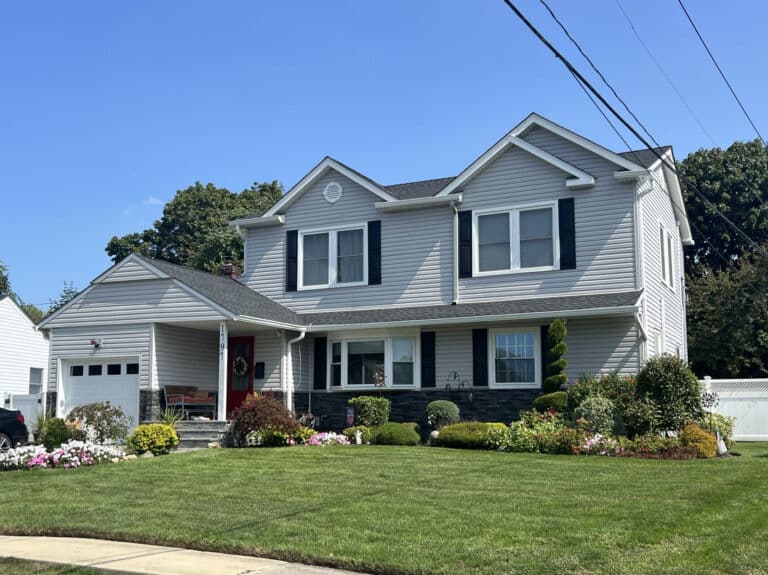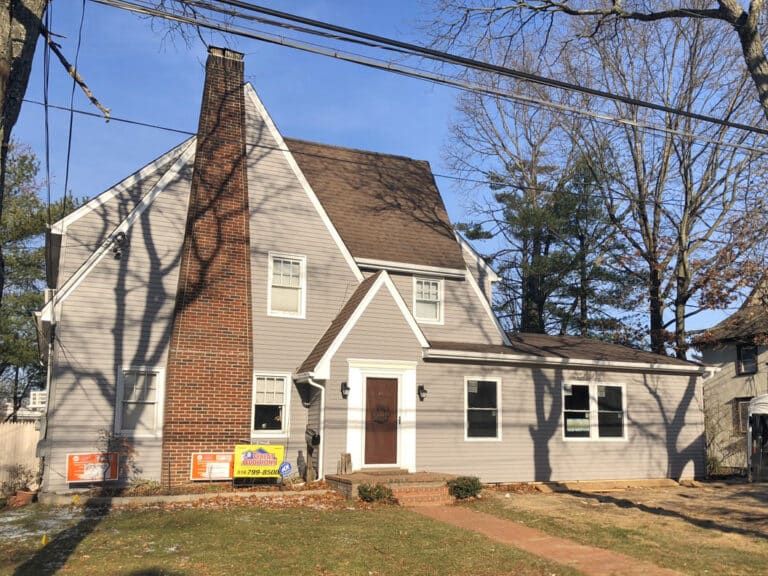When considering home renovations, many homeowners may ponder whether these improvements can have any tax benefits.
Tax deductions for home renovations are not broadly available for most projects; however, there are certain circumstances where you could qualify for tax relief.
Generally, personal use property improvements are not immediately tax-deductible, but they have the potential to reduce taxes once the property is sold by increasing the home’s cost basis.

It’s important to distinguish between different types of home improvements and their respective eligibility for tax deductions.
Some improvements may be eligible for tax credits if they are for renewable energy, while others, such as those that are medically necessary or for a home office, may be deductible in the year they are paid.
Understanding the difference between tax deductions and tax credits is crucial as each has a distinct impact on your tax liability.
Furthermore, the tax implications vary significantly when dealing with rental or investment properties.
In these cases, renovations can often be depreciated over time, reducing taxable income in the years following the improvements.
Engaging with a financial professional can help navigate these complexities, ensuring that any qualifying deductions are correctly claimed.
Key Takeaways
- Not all home renovations are tax-deductible, but they can affect the home’s cost basis.
- Certain improvements may qualify for deductions or tax credits, particularly if for medical, business, or energy efficiency purposes.
- Renovations on rental or investment properties can often be depreciated, impacting taxable income.
Understanding Tax Deductions and Credits
When exploring tax incentives for home renovations, it’s essential to understand the distinct impacts of tax credits and deductions on your financial obligations to the IRS.
Differences Between Tax Credits and Deductions
Tax Deductions reduce your taxable income, essentially decreasing the portion of your income that is subject to tax. Examples include:
- Mortgage Interest Deduction
- Property Tax Deduction
A tax deduction can be a powerful tool to lower your tax bill by adjusting your income to a lower bracket, but it doesn’t directly decrease the amount of tax you owe.
Tax Credits, on the other hand, are a dollar-for-dollar reduction in the amount of tax you owe. Consider them as a form of payment towards your tax liability.
Key points to note:
- Non-refundable tax credits: Can reduce your tax owed to zero but will not result in a refund.
- Example: Energy-Efficient Home Improvement Tax Credit
- Refundable tax credits: Can reduce your tax liability below zero, potentially resulting in a refund.
- Example: Residential Renewable Energy Tax Credit
Table 1: Comparison of Tax Credit and Tax Deduction
| Feature | Tax Credit | Tax Deduction |
|---|---|---|
| Effect on Tax | Reduces tax owed directly | Reduces taxable income |
| Dollar Amount | Often more significant | Less immediate impact |
Eligibility for Home Renovation Tax Benefits
Eligibility for tax benefits from home renovations is specific and depends on various factors assessed by the IRS.
Tax credits for home renovations typically focus on improvements that increase energy efficiency or use renewable energy, with precise eligibility criteria.
Tax deductions could be associated with renovations that improve your home office, if you work from a qualifying home office, or interest on loans taken out for home improvements.
Your eligibility for these benefits is subject to:
- The nature of the improvements
- The use of your home (personal vs. business)
- Compliance with IRS regulations
Be sure to consult the latest IRS guidelines or a tax professional to properly assess your specific situation for home renovation tax benefits.
Qualifying Home Improvements

When considering tax-deductible home improvements, understanding the types of upgrades that qualify is essential. Certain improvements can lead to tax benefits, particularly if they fall into categories such as energy efficiency or medical necessity.
Energy Efficient Upgrades
Energy-efficient home improvements can be valuable for reducing your tax liability. Items like added insulation, new windows, and clean energy systems are often eligible for tax credits.
Qualifying products must meet specific energy standards. For instance:
- Windows, Doors, Skylights: Must meet Energy Star standards
- Insulation: Must be designed to reduce heat loss/gain
- Clean Energy: Solar panels, wind turbines, and geothermal heat pumps
These upgrades not only save on taxes but reduce energy bills.
Medical-Related Improvements
Home improvements for medical reasons can be deducted if they do not add value to the property and their main purpose is medical care for you, your spouse, or your dependents.
This includes installing handrails or ramps for improved access. These modifications must be considered reasonable and necessary for the medical care. Examples of deductible improvements include:
- Construction of ramps
- Widening doors and hallways for wheelchair access
- Installation of railings, support bars, or other modifications
Make sure to document these changes with medical necessity statements from a doctor.
Capital Improvements vs. Repairs
Distinguishing between capital improvements and repairs is crucial as the former can add value to your home and prolong its life, potentially qualifying for tax deductions upon sale.
Repairs, however, are typically not deductible as they are meant to maintain the home’s current value.
| Capital Improvements | Repairs |
|---|---|
| Addition of a new room | Fixing leaks or broken panes |
| Replacing an entire roof | Painting or patching walls |
| Installing a new heating system | Repairing electrical appliances |
Deductions for Homeowners
As a homeowner, you can capitalize on certain tax deductions, with mortgage interest and real estate taxes being significant areas where you can save. If you use part of your home for business, the home office deduction can also be an advantage come tax time.
Mortgage Interest and Real Estate Taxes
Mortgage Interest: You can deduct the interest you pay on your mortgage if you itemize deductions on your tax return. This is applicable to:
- Primary mortgages
- Home equity loans
- Home equity lines of credit (HELOCs)
For homes purchased after December 15, 2017, interest on the first $750,000 ($375,000 for married filing separately) of the mortgage debt is deductible.
Real Estate Taxes: Property taxes that you pay on your primary residence and a vacation home are deductible. There are limits:
- The total deduction for state and local taxes (SALT), including real estate taxes, cannot exceed $10,000 ($5,000 if married filing separately).
Remember, these deductions are available only if you itemize on Schedule A (Form 1040).
Home Office Tax Deductions
Home Office Deduction: If you’re self-employed and use part of your home for business, you might be eligible for the home office deduction. To qualify:
- Regular and Exclusive Use: You must regularly use part of your home exclusively for conducting business.
- Principal Place of Your Business: Your home should be the primary place where your business is conducted.
Calculating the Deduction: You can calculate your home office deduction using:
- Simplified Option: Deduct $5 per square foot of your home used for business, up to 300 square feet.
- Regular Method: Deduct a proportionate amount of your actual home expenses based on the percentage of your home used for business.
Remember to maintain records that support your deductions, and consult a tax professional to ensure compliance with current tax laws.
Renovations on Rental and Investment Properties
When you make renovations to your rental or investment properties, you may be able to reap tax benefits through depreciation deductions and by understanding the IRS rules for rental property expenses.
Depreciating Improvements
Eligible Improvements: Not all improvements can be depreciated. You must identify renovations that add value, change the use, or extend the life of the property. Examples include adding a new roof, renovating a kitchen, or installing a new HVAC system.
- Depreciation Timeline: Typically, the IRS allows residential rental properties to be depreciated over 27.5 years. For improvements, this period may vary depending on the nature of the upgrade.
- Method: The Modified Accelerated Cost Recovery System (MACRS) is the current method for depreciation, which allows for greater deductions in the early years of the property’s life.
Rental Property Deduction Rules
Immediate Expenses: Some renovation costs can be deducted in the year they are incurred. These generally include repairs that maintain the property in good condition, such as painting or fixing leaks.
- Capitalizing Renovations: For tax purposes, renovations that add value to your property must be capitalized and depreciated over time.
- Passive Activity Loss Rules: If you’re not a real estate professional, there are limits to the amount of losses you can deduct from passive activities, including rental properties.
Deductions Against Rent Income: All ordinary and necessary expenses to manage, conserve, or maintain the rental property, including interest and property taxes, can be deducted from your rental income.
- Keep Records: To substantiate your deductions, you’re required to keep detailed records of all expenses, including renovation costs.
Tax Benefits:
- Deducting depreciation can provide significant tax advantages by reducing your taxable rental income each year.
- Careful planning of improvements can optimize your deductions while complying with IRS rules.
Tax Incentives for Clean Energy

When renovating your home, you have the opportunity to take advantage of tax credits for incorporating clean energy solutions. These incentives are designed to reduce your tax bill when you invest in certain energy-efficient systems.
Residential Clean Energy Credit
You are eligible for the Residential Clean Energy Credit if you have installed solar panels, small wind turbines, solar water heaters, or fuel cells in your primary residence or a second home. This credit amounts to 26% of the cost of the equipment and installation for systems put in service before December 31, 2022. For systems installed between January 1, 2023, and December 31, 2023, the credit will drop to 22%.
Eligible Installations:
- Solar panels for generating electricity
- Solar-powered water heaters (must be certified for performance by the Solar Rating and Certification Corporation or a similar entity endorsed by the state)
- Wind turbines that have a capacity of up to 100 kilowatts
- Fuel cell systems (must have a minimum efficiency of 30% and provide at least 0.5 kW of electricity)
Non-Business Energy Property Credit
The Non-Business Energy Property Credit is focused on energy efficiency improvements. Eligible upgrades include the addition of insulation, installation of energy-efficient windows, and heating and cooling systems like heat pumps that meet specific energy-efficiency requirements.
Eligible Improvements:
- Insulation materials and systems designed to reduce heat loss or gain
- Exterior windows, including skylights and storm windows
- Exterior doors and storm doors
- Central air conditioning and air-source heat pumps
- Natural gas, propane, or oil water heaters and furnaces
Please note that for tax years 2022 and 2023, this credit is limited to a lifetime cap of $500, with limits on specific types of equipment. For example, windows are capped at $200, and qualifying furnaces and boilers are limited to $150. Keep receipts and manufacturer’s certifications for your records as proof of eligibility.
These tax credits can significantly offset the upfront cost of installing energy-efficient systems and contribute to long-term savings on utility bills. Use Form 5695 to claim your Residential Clean Energy Credit and the Non-Business Energy Property Credit when filing your taxes.
Calculating the Basis in Your Home

When it comes to tax deductions on home renovations, it’s essential to understand your home’s basis and how certain improvements can alter it. This will determine the taxable gain when you sell your property.
Understanding Basis and Adjusted Basis
Basis generally refers to the amount of your investment in the home for tax purposes. The initial basis usually includes the purchase price plus certain settlement fees and closing costs. When you improve your home, these costs can change the basis, resulting in an adjusted basis.
Below is a simplified equation to calculate your basis:
{Initial Basis} = {Purchase Price} + {Closing Costs} + {Cost of Property Improvements (at time of purchase)}
Remember, documentation is key. Keep records of all your transactions related to the purchase, construction, and restoration of your property.
Improvements That Affect Basis
Improvements that add to the value of your home, prolong its useful life, or adapt it to new uses will increase your basis. Generally, repairs that maintain your home in good condition do not affect your basis. Here’s a quick reference to distinguish between the two:
Improvements:
- Adding a new room or bathroom
- New plumbing or wiring systems
- Installing a new roof
- Paving your driveway
Repairs:
- Fixing leaks
- Painting your home
- Repairing floors or plaster
To integrate the cost of improvements into your basis:
{Adjusted Basis} = {Initial Basis} + {Cost of Qualified Improvements}
Some renovations may also qualify for energy credits, which can provide tax savings.
Navigating Deductions with Financial Professionals
Engaging with a financial or tax professional can play a pivotal role in maximizing your tax deductions for home renovations. These experts will guide you through complex tax laws, ensuring you understand which renovations may qualify for deductions based on the relationship to your adjusted gross income.
When to Consult a Tax Professional
Consult a tax professional if the following applies to you:
- Complex Renovations: You’ve completed renovations that could be considered a medical necessity or a home office expense.
- Rental Properties: You own rental property and have renovated the space.
- Sale of Property: You are planning to sell a property and have made significant improvements that may affect the basis.
- High Income: Your adjusted gross income is high, and you’re seeking ways to maximize deductions.
Documentation and Record-Keeping
Maintain thorough records of the following:
- All receipts associated with the home renovation.
- A detailed account of the work done, specifying the date of completion and purpose.
| Document | Purpose | Where to Keep |
|---|---|---|
| Receipts | Prove expenses for potential deductions | Secure filing system |
| Invoices | Detail scope and cost of renovations | Digital and physical |
| Contracts | Outline agreements with contractors | Locked cabinet or safe |
Frequently Asked Questions
Knowing which home renovations are tax-deductible can greatly impact your financial decisions and tax outcomes. Here, you will find clear answers to common tax deduction queries related to home improvements.
What types of home improvements are tax deductible in the year 2024?
In 2024, tax-deductible home improvements are generally those that increase your home’s value, adapt it for new uses, or prolong its life. These include major improvements like a new roof or an addition. Repairs alone typically do not qualify for a tax deduction.
Can I write off home improvements on my rental property for tax purposes?
Yes, you can write off home improvements on your rental property if they are classified as expenses that increase the property’s value or extend its life. These improvements must be capitalized and depreciated over time, not deducted in the year they are incurred.
Are there specific home improvement deductions available when selling my home?
When selling your home, certain capital improvements can be added to the home’s cost basis, possibly reducing the taxable gain on the sale. Examples include room additions, new fencing, or a new roof if they were in place when the house was sold.
How does tax deduction work for business-related home improvements?
If you make home improvements directly related to your business space within your home, these costs can be fully deductible as a business expense in the year they are paid, provided they are reasonable and necessary for your business.
Are any home improvements deductible when using a portion of the home for business?
Yes, if you use part of your home regularly and exclusively for business purposes, you might be able to deduct a portion of the home improvements based on the percentage of your home’s usage for business. This deduction is subject to many conditions and limitations.
Which capital home improvements qualify for tax deductions?
Capital home improvements that qualify for tax deductions include those that increase the property’s value, significantly prolong its useful life, or adapt it to new uses.
These improvements must be substantial and add value to be considered for tax deductions.








